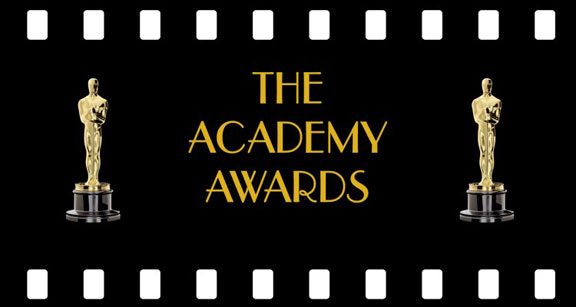Best Picture Nominees
The Academy Awards will be broadcast on February 24, 2018. Below is a look at how I would rank the Best Picture nominees. If you haven’t had a chance to see them all, or you want to check out your favorite again on the big screen, do not fret! Regal Cinemas at Destiny USA will be showcasing each of the films below (with the exception of ROMA, which you can only stream through Netflix) beginning on February 15. Enjoy!
1.) THE FAVOURITE
When it comes to the Academy, there’s no denying that their amorous feelings towards any decent “period/costume” drama. Though often visually arresting, these films tend to coagulate together to create an indistinguishable and forgettable slog. This year, however, “The Favourite” may serve as a period piece, but Best Director nominee Yorgos Lanthimos’s lavish production is anything but forgettable.
Olivia Colman (nominated for Best Actress) plays the hot-headed and pain-riddled Queen Anne. Often confined to her bed, and rarely able to move about on her own, she oversees her kingdom with the help of her confidant Duchess of Marlborough, Sarah Churchill (Best Supporting Actress nominee Rachel Weisz). Sarah provides comfort to the ailing Queen in a variety of ways, and when her cousin Abigail Hill (Best Supporting Actress nominee Emma Tone) appears in hopes of
procuring employment, she barely takes notice. As Abigail integrates herself within the castle walls and the company of the Queen, however, a savage battle of wits and wills ensures.
Lanthismos’s film is not only beautiful to look at, but also fiercely funny and boasts three of the strongest performances of the year. It was a rejuvenating, unexpected surprise that tackles a genre that has been explored countless times before, yet finds a way to make it feel entirely new and refreshing. Every scene is crammed with dazzling splendor, which serves in stark contrast to the razor-ship wit that it exudes from start to finish. Though it may be a dark horse to take home the Best Picture prize, it would certainly be my pick, and is one of the few titles nominated that I would crown as an absolute must see.
2.) BLACKkKLANSMAN
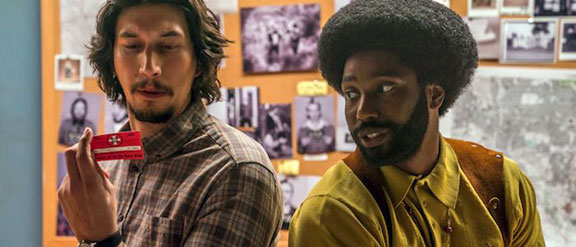
Director Spike Lee delivered his best film in over a decade with the surprisingly hilarious and often unsettling BLACKkKLANSMAN. Based on a true story of Ron Stallworth (John David Washington) the first African American police officer in the Colorado Springs Police Department, it tackles themes such as racism, acceptance, and moral ambiguity.
When Stallworth is assigned to the intelligence division, he comes out with an outlandish plan to bring down the local Ku Klux Klan. He makes contact with the group over the telephone, and then sends another officer, Flip Zimmerman (Best Supporting Actor nominee Adam Driver) to attend the meetings in person.
Remarkably, this serves as the first Best Director nomination for legendary filmmaker Lee. And, while it’s absurd that it took this long, this particular nomination was a guarantee. Providing applicable social commentary under the guise of comedy, it is equally terrifying and hilarious. Laugh-out-loud moments are intermixed with profound explorations of bigotry and hatred, and while the film is set in the 70’s, Lee ensures that the viewer will make a correlation between the vileness expounded then, and how much of this rhetoric persists today.
3.) A STAR IS BORN

Proving that an ageless tale always finds a way to shine, the story of A STAR IS BORN has already graced the big screen three separate times. The first was in 1937 and starred Janet Gaynor and Fredric March. The next iteration was released in 1954 and featured Judy Garland and James Mason. The third time around, it was released in 1976 and featured Barbara Streisand and Kris Kristofferson. When news came out that the timeless showbiz saga would be produced yet again, the names attached —Lady Gaga and Bradley Cooper— certainly seemed like an unconventional pairing. When it was further revealed that it would also serve as Cooper’s directorial debut, and he was co-writing the script as well, there was plenty of intrigue, but also a slew of question marks.
Any feelings of doubts that may have surrounded the production were thoroughly squashed with the release of the hard-hitting drama. Featuring an Oscar worthy turn by Best Actress nominee Lady Gaga in her first major cinematic role, and a career defining turn from Best Actor nominee Cooper, the story of asuccessful rock star and his newfound muse resonated with fans of the originals and those who were tackling the tale for the first time. Fueled by a number of excellent songs (including Best Song nominee “Shallow”) and the searing synergy of its stars, this most unlikely of candidates may prove to be the best version of this story that has yet to be told. Working as an engaging road movie and a searing drama, it found a way to put an original spin on a story that has been entertaining audiences for eight decades.
4.) VICE
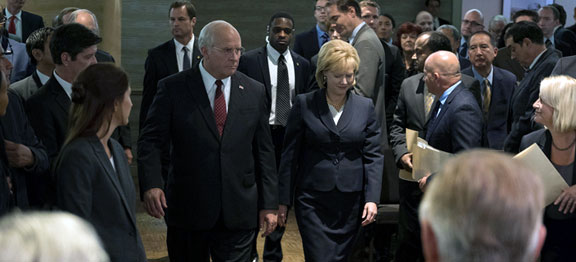
Last year, Gary Oldman was nearly unrecognizable underneath the stunning makeup that transformed him into Winston Churchill in THE DARKEST HOUR. His performance as the stoic, brilliant leader landed him and Academy Award for Best Actor. This year, another major star made a stunning transformation in order to tackle a major world leader. Christian Bale’s performance as Dick Cheney in VICE has already won him a Golden Globe, and has help him emerge as one of the major frontrunners to find glory on Oscar night.
In most cases, the exploration of a controversial Vice President would result in a hard-hitting drama that focused on his perilous moments in office. In the hands of Academy Award nominee Adam McKay, however, the unconventional biopic is played off as a comedy. Bale’s ability to embody the gruff and infuriating Cheney is downright frightening at times, and as Lynne Cheney, Best Supporting Actress nominee Amy Adams provides another unforgettable turn as the Veep’s unflappable partner in crime. Together, they paint the picture of a union of two like-minded, power-hungry individuals whose aspirations far exceed what may be best for the nation. Hilariously funny in one moment, and starkly disconcerting in the next, it provides an eye-opening account of what a quest for absolute power can do to a person, their family, and our country.
5.) BLACK PANTHER

It’s not often that a movie based on a comic book character receives a Best Picture nod, but it’s even rarer for a film to have the cultural impact that BLACK PANTHER did. Bringing to life a character and a culture that had yet to be explored within the Marvel Universe, the film obliterated racial divides and presented a beautiful and dynamic visual spectacle that ranked amongst the year’s best.
It was refreshing to see the MCU get away from the star-studded, multi-superhero filled extravaganza that we have grown accustomed to in their recent endeavors. This wasn’t merely another AVENGERS flick. Director Ryan Coogler delivered a story that stood on its own merits, and allowed the phenomenal performances of Chadwick Boseman, Michael B. Jordan, Lupita Nyong’o, and Danai Gurira to take center stage. While there was a plethora of special effects, and it had a number of dynamic action sequences, the story of T’Challa and his beloved Wakanda was of even greater importance than the battles that raged around him. Serving as a rallying cry for those who were underrepresented and often ignored in cinema, it was a culturally diverse powerhouse that resonated with audiences of virtually every generation and walk of life.
6.) ROMA
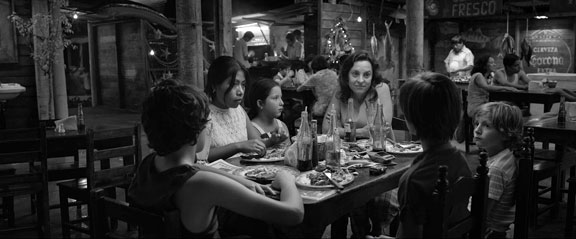
Alfonso Cuaron’s deeply personal film, ROMA has been hailed as a masterpiece by many, and seems to be the frontrunner when it comes to the Best Director and Best Picture Academy Awards. Set amidst the politically turbulent atmosphere of a neighborhood in Mexico City in the 1970’s, the film follows a nanny as she looks over a family whose stability is as fragile as the infrastructure around them.
In a daring move, Cuaron cast the unknown Yalitza Aparicio in the lead role, and his gamble paid off. Her debut performance garnered a Best Actress nomination, and also provided the authenticity that was needed to make her character resonate with the audience. Presented in stunning black and white, the visuals are striking. Cuaron masterfully recreated the era of his youth with meticulous detail, and often the viewer will find themselves exploring background and set-pieces that sprawl around the central characters even more than the performers themselves.
The story follows Cleo (Aparicio) as she attempts to keep her affluent employer’s family together, while navigating her own personal perils and demons. For me, and I understand I am in the minority here and may very well be approaching cinematic sacrilege, I didn’t find the story nearly as profound and engaging as many of my contemporaries. There were certainly a handful of memorable and shockingly harrowing sequences, but beyond that, I failed to find myself caring enough about the characters on the screen. I can certainly appreciate ROMA as a towering technological achievement, and won’t deny that I wasn’t transfixed by its beauty, but the saga of Cleo and the family she looks after didn’t quite engage me as completely as a number of the other titles listed above.
7.) GREEN BOOK
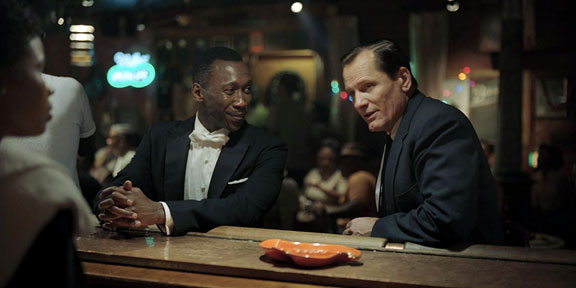
Much like Spike Lee’s BLACKkKLANSMAN, Peter Farrelly’s GREEN BOOK took a subject that has deep social implications and, through the Oscar nominated screenplay by Nick Vallelonga, Brian Currie and Farrelly, adds humor and brevity to create an entertaining film that transcends typical genre norms.
Best Actor nominee Viggo Mortensen plays Frank “Tony Lip” Vallelonga, a no-nonsense Italian who, in the mid 60’s works as a bouncer in a nightclub. When the club is shut down, he receives an offer to drive talented pianist “Doc” Don Shirley (Best Supporting Actor front-runner Mahershala Ali) he sets forth on a tour of the Deep South. Unconcerned with the bigotry and violence that will surely be hurled at them, Frank takes the job, and an unlikely bond forms between the two unlikely allies.
Since the release of the film, Shirley’s family has disputed how the relationship between employer and employee was portrayed, but within the film itself, it’s completely endearing. The fusion of comedy and drama worked well, and Ali showcased his immense talent to take over a film (much like he did in MOONLIGHT) once again. Mortensen certainly pulls his weight as well, and it is the performances of the two leads is what lends credence and believability to their unlikely union, and highlights the importance of breaking down stereotypes and racial divides.
8.) BOHEMIAN RHAPSODY
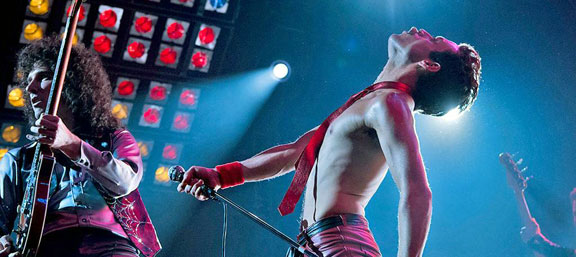
Prior to the release of BOHEMIAN RHAPSODY, a biopic based on Queen and their enigmatic lead singer Freddie Mercury, had been swirling in developmental limbo for over a decade. Numerous names had been rumored to tackle the impossible task of filling Mercury’s larger-than-life shoes, but when the film finally went into production, it was MR. ROBOT’s Rami Malek who landed the lead role. Early pictures from the set portrayed a spitting image of the infamous rock star, and excitement built dramatically from that point on.
Malek’s incredible portrayal of Mercury landed him a Best Actor (Drama) Golden Globe, and lead to an Academy Award nomination. He is, without a doubt, the reason for the success of the film. Playing one of the most exuberant personalities in the history of music was surely no easy task, and yet the talented Malek made it look both fun, and effortless. He captured the look, the voice, and the essence of Mercury, and shined constantly even when the movie did not. Though adequately entertaining, there is certainly a feeling that there was much more content as it related to the band that was glossed over and rushed. Mercury may be the story, but surely Queen’s meteoric rise deserved a bit more exploration than a snappy montage can provide. The result is a biopic that is full of great music and a singularly dynamic performance, but overall fails to deliver the in-depth look at the band’s story that existed between the margins.
